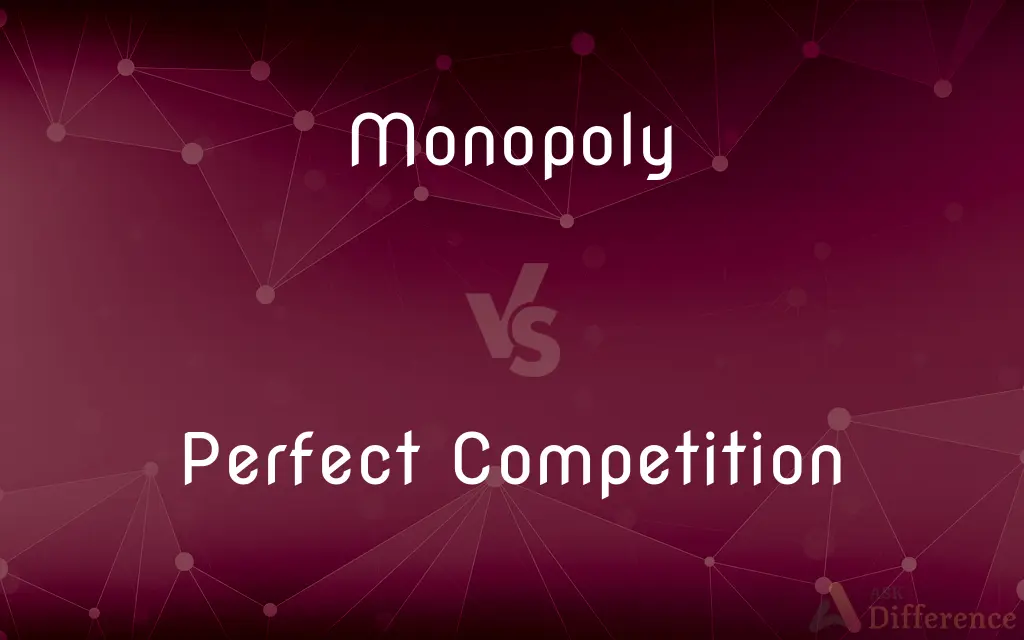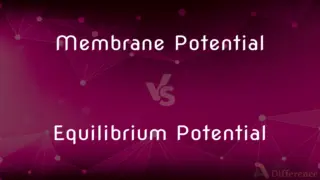Monopoly vs. Perfect Competition — What's the Difference?
Edited by Tayyaba Rehman — By Fiza Rafique — Published on December 28, 2023
Monopoly is a market structure with one dominant firm, controlling prices. Perfect Competition is a market with many firms, identical products, and no price control.

Difference Between Monopoly and Perfect Competition
Table of Contents
ADVERTISEMENT
Key Differences
Monopoly and Perfect Competition represent opposite ends of market structures. In a Monopoly, one firm dominates the entire market, often resulting in limited choices and higher prices for consumers. On the other hand, Perfect Competition is characterized by numerous firms selling identical products, leading to ample choice and market-determined prices.
A distinguishing feature of Monopoly is its ability to set prices without external competition. This price-setting capability is often achieved due to barriers to entry, such as high startup costs or unique resources. Conversely, in Perfect Competition, no single firm can influence prices. Prices are determined by supply and demand, with individual firms being price takers.
Product differentiation is another area where Monopoly and Perfect Competition differ significantly. In a Monopoly, the singular product may be unique, with no close substitutes available. In Perfect Competition, however, products are homogenous, and consumers perceive them as identical across all firms.
When considering consumer and producer surplus, a Monopoly can result in decreased consumer surplus due to higher prices. Perfect Competition maximizes consumer and producer surplus, ensuring allocative efficiency, where resources are allocated optimally based on consumer preferences.
In conclusion, while Monopoly offers benefits like economies of scale and potential for innovation, it may lead to consumer exploitation. Perfect Competition ensures consumer welfare with competitive prices but may limit innovative incentives for firms.
ADVERTISEMENT
Comparison Chart
Number of Sellers
One
Many
Price Control
Yes (Price Maker)
No (Price Taker)
Product Differentiation
Unique product
Homogenous/Identical products
Barriers to Entry
High
None
Consumer Choice
Limited
Abundant
Compare with Definitions
Monopoly
A market dominated by a single firm.
The software company had a virtual Monopoly in the operating systems market.
Perfect Competition
The idealized extreme of competitive markets.
Economists use Perfect Competition as a benchmark in studies.
Monopoly
Exclusive control over a product or service.
The patent granted them a Monopoly for 20 years.
Perfect Competition
Absence of individual price-setting power by firms.
In Perfect Competition, sellers accept the prevailing market price.
Monopoly
Sole provider of a particular good or service.
The island had a Monopoly on rare minerals.
Perfect Competition
A market scenario with no barriers to entry or exit.
Perfect Competition means new firms can easily join or leave.
Monopoly
Absence of competition in a specific industry.
The utility company's Monopoly ensured they faced no competitors.
Perfect Competition
A market with numerous firms and identical products.
The agricultural sector often approximates Perfect Competition.
Monopoly
Exclusive control by one group of the means of producing or selling a commodity or service
"Monopoly frequently ... arises from government support or from collusive agreements among individuals" (Milton Friedman).
Perfect Competition
Condition of equal market access and information.
Perfect Competition assumes all players have the same data.
Monopoly
A company, group, or individual having exclusive control over a commercial activity.
Monopoly
A commodity or service so controlled.
Monopoly
Exclusive possession or control
Arrogantly claims to have a monopoly on the truth.
Monopoly
Something that is exclusively possessed or controlled
Showed that scientific achievement is not a male monopoly.
Monopoly
A situation, by legal privilege or other agreement, in which solely one party (company, cartel etc.) exclusively provides a particular product or service, dominating that market and generally exerting powerful control over it.
Monopoly
An exclusive control over the trade or production of a commodity or service through exclusive possession.
A land monopoly renders its holder(s) nearly almighty in an agricultural society.
Monopoly
The privilege granting the exclusive right to exert such control.
Granting monopolies in concession constitutes a market-conform alternative to taxation for the state, while the crown sometimes bestowed a monopoly as an outrageous gift.
Monopoly
(metonymy) The market thus controlled.
Monopoly
(metonymy) The holder (person, company or other) of such market domination in one of the above manners.
Monopoly
The exclusive power, or privilege of selling a commodity; the exclusive power, right, or privilege of dealing in some article, or of trading in some market; sole command of the traffic in anything, however obtained; as, the proprietor of a patented article is given a monopoly of its sale for a limited time; chartered trading companies have sometimes had a monopoly of trade with remote regions; a combination of traders may get a monopoly of a particular product.
Raleigh held a monopoly of cards, Essex a monopoly of sweet wines.
Monopoly
Exclusive possession; as, a monopoly of land.
If I had a monopoly out, they would have part on 't.
Monopoly
The commodity or other material thing to which the monopoly relates; as, tobacco is a monopoly in France.
Monopoly
(economics) a market in which there are many buyers but only one seller;
A monopoly on silver
When you have a monopoly you can ask any price you like
Monopoly
Exclusive control or possession of something;
They have no monopoly on intelligence
Monopoly
A board game in which players try to gain a monopoly on real estate as pieces advance around the board according to the throw of a die
Monopoly
Exclusive possession or control in a sector.
The media conglomerate aimed to establish a Monopoly in broadcasting.
Common Curiosities
What characterizes a Monopoly?
A Monopoly is characterized by a single firm dominating the market, setting prices.
How are prices determined in Perfect Competition?
Prices in Perfect Competition are determined by supply and demand, with firms being price takers.
What's the defining trait of Perfect Competition?
Perfect Competition involves many firms, identical products, and no individual price control.
Can a Monopoly lead to higher prices?
Yes, without competition, a Monopoly can charge higher prices.
Are there legal restrictions against monopolies?
Yes, many countries have antitrust laws to prevent or regulate monopolies.
Why can't firms in Perfect Competition set their prices?
Due to the homogenous nature of products, firms in Perfect Competition are price takers.
Can monopolies innovate more?
Potentially, as monopolies may have more resources for research and development.
Why is Perfect Competition often used in economic studies?
It's an idealized benchmark to study market efficiency and behavior.
What barriers can help create a Monopoly?
High startup costs, patents, and control over unique resources can foster a Monopoly.
Are monopolies always bad for consumers?
Not always. While monopolies can raise prices, they might also invest in research and innovation.
Is Perfect Competition practical in real-world markets?
While rare, some sectors, like agriculture, can come close to Perfect Competition conditions.
How does product differentiation vary between the two?
Monopolies might offer unique products, while in Perfect Competition, products are identical.
Can a Monopoly be broken up?
Yes, regulatory bodies can intervene to break up or regulate monopolies.
Do all markets fall into these two extremes?
No, many markets exist between these extremes, like monopolistic competition and oligopoly.
Is consumer choice greater in Perfect Competition?
Absolutely, with many firms and identical products, consumers have abundant choices.
Share Your Discovery

Previous Comparison
Estuve vs. Estaba
Next Comparison
Membrane Potential vs. Equilibrium PotentialAuthor Spotlight
Written by
Fiza RafiqueFiza Rafique is a skilled content writer at AskDifference.com, where she meticulously refines and enhances written pieces. Drawing from her vast editorial expertise, Fiza ensures clarity, accuracy, and precision in every article. Passionate about language, she continually seeks to elevate the quality of content for readers worldwide.
Edited by
Tayyaba RehmanTayyaba Rehman is a distinguished writer, currently serving as a primary contributor to askdifference.com. As a researcher in semantics and etymology, Tayyaba's passion for the complexity of languages and their distinctions has found a perfect home on the platform. Tayyaba delves into the intricacies of language, distinguishing between commonly confused words and phrases, thereby providing clarity for readers worldwide.











































